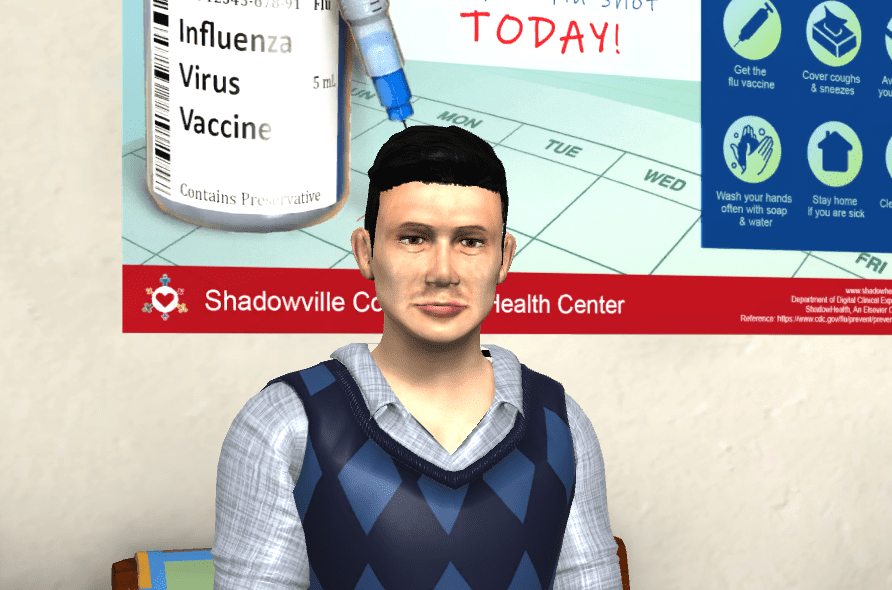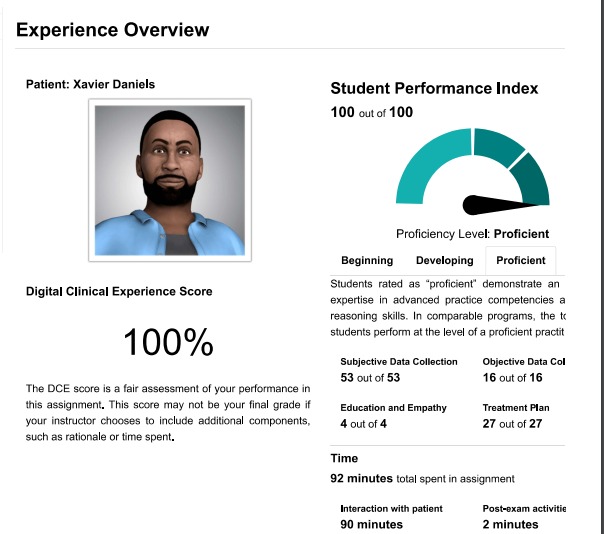 Nursing education is rapidly evolving to meet the demands of an increasingly diverse and complex healthcare landscape.
Nursing education is rapidly evolving to meet the demands of an increasingly diverse and complex healthcare landscape.
One of the most pressing areas of focus is providing comprehensive HIV education for nurses and nursing students.
This education must extend beyond basic understanding to encompass effective HIV care practices, prevention strategies, and cultural sensitivity to ensure that nurses are equipped to care for all patient populations, especially those that face health disparities.
HIV education for nursing students is critical, given the vital role nurses play in the prevention, care, and treatment of HIV-positive patients.
Enhancing HIV Education and Cultural Competency in Nursing Through Virtual Patient Simulations
This article explores the intersection of HIV care, cultural sensitivity, virtual patient simulations, and the training needed for nurses to address the unique healthcare needs of diverse patient groups, including those from the LGBTQ+ community, and individuals living with HIV.

Struggling to meet your deadline?
Get your assignment on Quan Van Tran Shadow Health Assessment done by certified MDs and PhDs in the USA. ORDER NOW!
Cultural Sensitivity in Nursing Education
Understanding cultural sensitivity in healthcare is a cornerstone of nursing education. Cultural sensitivity training for nurses helps them develop an awareness of and respect for the diverse cultural backgrounds and healthcare needs of their patients. It is essential for nurses to embrace cultural humility—an ongoing process of self-reflection and learning—so they can provide care that is respectful, inclusive, and appropriate for diverse patient populations.
Quan Van Tran Shadow Health Assessment
The importance of cultural humility for nursing students cannot be overstated. Cultural humility in healthcare education encourages nurses to recognize their own biases and actively seek to understand the cultural contexts of their patients’ lives. This is particularly important when working with diverse patient groups, including Asian American and Vietnamese populations, who may have distinct healthcare needs shaped by cultural beliefs and experiences.
For example, in the case of Quan Van Tran, a 50-year-old Vietnamese American man diagnosed with HIV, it would be inappropriate for students to ask him to define himself by his sexual orientation. Instead, nurses must learn how to ask culturally sensitive, medically relevant questions about his sexual history, without pressing him to disclose personal aspects of his identity that he may not wish to share. This approach requires cultural sensitivity training and education on the unique healthcare needs of Asian American populations, as well as the broader understanding of healthcare stigma and discrimination.
Training Nurses for Effective HIV Care
Nurses play a critical role in HIV prevention and care. Proper HIV care training for nurses ensures that healthcare providers are equipped to manage the physical, emotional, and social aspects of HIV care. Nurses must be trained to provide effective HIV care nursing practices that include counseling, education, and support for patients, particularly those who may face significant barriers due to stigma or discrimination. HIV care training for nursing students should include education on HIV testing, prevention strategies, and treatment options to help reduce transmission and improve patient outcomes. 
The training should also emphasize HIV prevention education for nurses, especially in settings where healthcare providers may encounter high-risk populations, such as those in LGBTQ+ communities or those from ethnic minority groups. Nurses’ role in HIV prevention is multifaceted and includes advocating for safer sex practices, educating patients about HIV transmission routes, and encouraging routine testing to identify HIV-positive individuals early in their infection. Given the unique challenges of working with HIV-positive patients, training should also address the emotional and psychological aspects of care, as stigma and discrimination often accompany an HIV diagnosis.
Using Virtual Simulations to Address Healthcare Gaps
One innovative approach to bridging the gap in HIV education and cultural competency is the use of virtual patient simulations. These simulations are increasingly being utilized in nursing education to expose students to scenarios they may not encounter in traditional clinical settings. Virtual nursing simulations allow students to engage in virtual patient scenarios, where they can practice assessment, diagnosis, and treatment in a safe, controlled environment. These simulations can be tailored to address specific healthcare issues, such as using virtual simulations to teach HIV care or virtual simulations for cultural competency training.
For instance, the Virtual simulations in healthcare education can help students experience the complexities of providing care to a patient living with HIV, such as addressing HIV stigma or dealing with a patient from a different cultural background. The inclusion of virtual simulations for cultural competency training ensures that nursing students are prepared to interact with patients from diverse backgrounds, like Asian Americans or Vietnamese individuals, who may have unique healthcare needs or cultural beliefs that influence their care.
Addressing HIV Stigma and Discrimination in Healthcare
HIV stigma remains a significant barrier to effective healthcare for those living with the virus. Many individuals with HIV face discrimination, not only in society at large but also within the healthcare system. Healthcare discrimination can manifest in various ways, including healthcare providers’ negative attitudes, refusal of care, or inadequate treatment. Nursing education on stigma should emphasize the importance of addressing this issue and developing strategies to reduce stigma in healthcare settings.
Virtual patient simulations can play a pivotal role in reducing HIV-related stigma by exposing nursing students to the emotional and social challenges faced by people living with HIV. By participating in simulations where students interact with virtual patients who may be experiencing stigma, they can learn how to respond empathetically and provide nonjudgmental care. Moreover, the use of these simulations enables students to practice addressing healthcare discrimination in nursing and to reflect on how their own biases may affect patient care.
The Role of Nurses in LGBTQ+ Health
Another area where cultural sensitivity and competency are crucial is in the care of LGBTQ+ populations. LGBTQ+ nursing care requires an understanding of the unique health disparities faced by these individuals, including higher rates of mental health issues, substance abuse, and sexually transmitted infections. LGBTQ+ health disparities are exacerbated by societal discrimination and healthcare professionals’ lack of training on LGBTQ+ issues. Nurses must receive training on LGBTQ+ health to ensure that they are equipped to provide inclusive care that respects the identities and needs of LGBTQ+ patients.
LGBTQ+ cultural sensitivity in nursing is vital to providing effective care. Nurses should be educated on how to create a welcoming and affirming environment for LGBTQ+ patients, where they feel safe to disclose their health concerns. By offering training nurses on LGBTQ+ health, nursing programs can help reduce disparities in care and improve health outcomes for these communities.
HIV Prevention and Awareness in Nursing Education
Incorporating HIV prevention strategies into nursing curricula is essential for educating nursing students about how to reduce the transmission of HIV in healthcare settings. Nurses must understand the importance of HIV testing and awareness in nursing education, as early detection and intervention can dramatically improve patient outcomes. HIV prevention for healthcare providers also includes education on the use of personal protective equipment, safe injection practices, and the importance of routine screening for high-risk populations. By emphasizing HIV awareness for nurses, nursing programs ensure that their graduates are prepared to contribute to the fight against the HIV epidemic.
The Impact of Virtual Simulations in Nursing Education
The integration of virtual simulations in nursing education is a transformative development in how nursing students acquire clinical skills and knowledge. These simulations provide an innovative teaching method that can replicate real-world healthcare scenarios, allowing students to practice without the pressure of real-time patient interactions. Virtual simulations in nursing education are especially effective in teaching sensitive topics like HIV care, cultural competency, and LGBTQ+ health, which may be underrepresented in traditional clinical experiences.
Clinical training through virtual simulations provides a unique opportunity for students to engage with patient scenarios in a safe and controlled environment. These simulations enhance the students’ ability to empathize with patients, develop critical thinking skills, and refine their clinical decision-making abilities. In addition to improving HIV care training, virtual simulations can be a valuable tool for enhancing nurse empathy through virtual patient experiences. Through these immersive experiences, students can better understand the challenges faced by diverse patient populations, which helps them provide more compassionate and culturally competent care.
Conclusion
In today’s healthcare environment, nurses must be prepared to care for a diverse range of patient populations, including those living with HIV, LGBTQ+ individuals, and those from different cultural backgrounds. Cultural competence and cultural sensitivity are essential components of nursing education, as they allow nurses to provide care that is respectful and inclusive. The use of virtual simulations in nursing education enhances students’ ability to respond effectively to the healthcare needs of diverse populations, including those with HIV and those from LGBTQ+ communities. By integrating HIV education, cultural sensitivity training, and virtual simulations into nursing curricula, educators can ensure that the next generation of nurses is equipped to address healthcare disparities and provide the best possible care to all patients.

Dont wait until the last minute.
Provide your requirements and let our native nursing writers deliver your assignments ASAP.